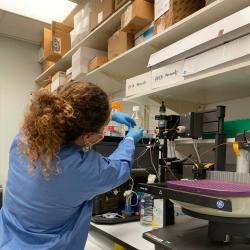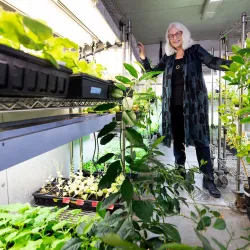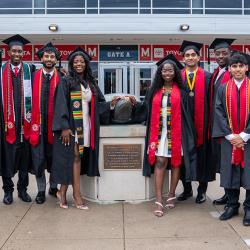Kevin McIver Named Interim Chair of UMD’s Department of Cell Biology & Molecular Genetics
Professor Kevin McIver will begin an appointment as interim chair of the University of Maryland’s Department of Cell Biology and Molecular Genetics (CBMG) on March 2, 2021.
“Kevin McIver is a respected member of the faculty and an outstanding microbiologist. His research, teaching, mentoring and administrative experience provide him with a firm foundation to move the Department of Cell Biology and Molecular Genetics forward,” said Amitabh Varshney, dean of UMD’s College of Computer, Mathematical, and Natural Sciences. “I am confident he will be an effective leader for the department, and I appreciate his willingness to step into this role.”
McIver joined the department as an associate professor with tenure in 2006 and was promoted to professor in 2014. He has served as associate chair of the department since 2018. Prior to joining UMD, he was an assistant professor in the Department of Microbiology at the University of Texas Southwestern Medical Center.
“I’m honored to have the opportunity to serve as interim chair of CBMG and will seek to foster a positive, conducive and equitable environment that allows everyone to contribute to the department’s continued success,” McIver said. “Although the SARS-CoV-2 pandemic has been a challenge for research and teaching, it has also allowed us to pursue new approaches and get a glimpse of what the future might look like with more virtual teaching, mentoring and administration. Fully returning to campus will require that CBMG provides our faculty, staff and students, at all ranks, with the tools and resources to adapt and thrive in this ‘new normal.’”
During his career, McIver has mentored over 40 undergraduate, master’s and doctoral students and postdoctoral fellows. Since 2016, he has served as co-director of a Ruth L. Kirschstein National Research Service Award Institutional Research Training Grant (T32) from the National Institutes of Health. The training grant supports graduate students studying host-pathogen interactions at UMD. McIver also led the biological sciences graduate program’s molecular and cellular biology concentration area from 2012 to 2015.
McIver’s research focuses on understanding how pathogens—like the bacteria Streptococcus—cause infectious diseases and avoid human immune responses. He uses genomics, genetic screens and animal models of infection to study the molecular mechanisms that underlie the interaction between pathogens and their human host during infection, such as the regulation of virulence factors produced by pathogens that are critical for disease and immune evasion. His work has been published in more than 60 refereed journal articles.
“My background as a microbiologist and a bacterial geneticist investigating host-pathogen interactions has required me to establish interdisciplinary teams to answer complex research questions,” McIver said. “I see this same collaborative spirit exhibited by my colleagues in CBMG as a strength and I hope to foster even more synergistic research and teaching endeavors across the department, university and beyond. One way to stimulate the research mission will be to enhance our existing core research facilities in the life sciences at UMD with new state-of-the-art instrumentation that will empower CBMG faculty and students to perform cutting-edge research.”
McIver currently serves on the editorial advisory board for the journals Molecular Microbiology and Infection and Immunity.
After earning his bachelor’s degree in biology and computer science from James Madison University in 1985, McIver received his Ph.D. in bacterial genetics and microbiology from the University of Tennessee’s Health Sciences Center in 1994. After that, he was a postdoctoral fellow and senior research associate at Emory University.
McIver succeeds Jonathan Dinman, who served as department chair since 2014. Dinman stepped down to become executive director at Skyhawk Therapeutics in Waltham, Massachusetts, where he will lead the virology division.
“As chair, Jon promoted a culture of diversity, tolerance and collaboration in the department,” Varshney said. “He also supported the faculty in their efforts to pursue research at the highest level of their respective fields, and he was a passionate advocate for training students and postdocs to prepare them to enter academic and industry careers.”
###
Media Relations Contact: Abby Robinson, 301-405-5845, abbyr@umd.edu
University of Maryland
College of Computer, Mathematical, and Natural Sciences
2300 Symons Hall
College Park, MD 20742
www.cmns.umd.edu
@UMDscience
About the College of Computer, Mathematical, and Natural Sciences
The College of Computer, Mathematical, and Natural Sciences at the University of Maryland educates more than 9,000 future scientific leaders in its undergraduate and graduate programs each year. The college's 10 departments and more than a dozen interdisciplinary research centers foster scientific discovery with annual sponsored research funding exceeding $200 million.








